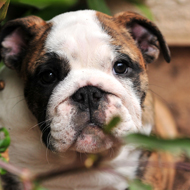
Results could be used to develop a genetic test
A link between genetic mutation and the presence of bladder stones in English bulldogs has been found by the University of Milan.
Published in Veterinary Record (2016)179, No 7) the study discovered a relationship between mutations in the SLC3A1 and SLC7A9 genes and the presence of cystine uroliths in English bulldogs.
Researchers say the results could be used to develop a genetic test for the identification of carrier and potentially affected dogs. This would eradicate the pathology from the breed while preserving genetic variability.
‘Cystinuria is a highly debilitating pathology, and surgery is often the inevitable solution,’ the authors explain. ‘In addition to the ethical problem of breeding dogs predisposed to developing the condition, the economic impact on owners in providing lifelong pharmacological support must also be considered.’
According to the study, English bulldogs are 32 times more likely to contract bladder stones than any other dog breed.
To investigate the association in some English bulldogs and genetic mutations, the team carried out an analysis on 24 English bulldogs. Nineteen had no clinical signs, while five displayed symptoms consistent with a urinary tract infection or bladder stones.
The study found that all of the affected dogs - all male - were characterised by mutations in the SLC3A1 gene. Furthermore, four of the dogs presented with mutations in the SLC7A9 gene.
According to the results, English bulldogs can be considered ‘carriers’ when they are heterozygotic at one or more of the three gene regions evaluated. They are ‘affected’ when they are homozygotic at exons 2 and 10 of the SLC3A1 gene, the authors write.



 The latest
The latest